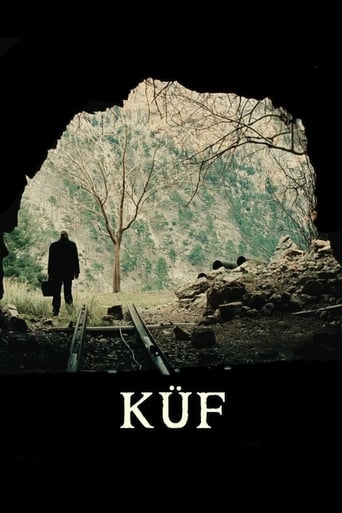



This movie was so-so. It had it's moments, but wasn't the greatest.
View MoreI am only giving this movie a 1 for the great cast, though I can't imagine what any of them were thinking. This movie was horrible
View MoreIn other words,this film is a surreal ride.
Amazing worth wacthing. So good. Biased but well made with many good points.
View MoreBeautifully shot, somber, slow moving and quiet, this is a character study of a late middle- aged railway worker alone and alienated from the world. His wife is dead, and his son - a political activist - disappeared 18 years ago, leaving a gaping hole of mystery in Basri's life. (Ercan Kesal is great in the lead, managing to make this disconnected, angry, sad shell of a man sympathetic and touching). Basri keeps writing to the authorities about his son, but never gets any answers, it just makes them suspicious of Basri himself (and annoyed at his persistence) turning him into the target of constant low level harassment and questioning. Basri also lives apart from his fellow workers, and when he comes upon a particularly creepy work compatriot raping a woman, a strong (if understated) enmity is born between the two men. Not much happens in terms of plot and event, This is definitely a mood piece first and foremost. But I found myself always drawn in, always involved. It works on both the head and the heart, and tells a tale both the personal and political. A subtle film of power.
View MoreKUF (MOLD) is a slow-moving drama shot in the style associated with Nuri Bilge Ceylan, with lots of lengthy shots in which very little actually happens. We observe characters moving within the frame, or talking to one another, but there is little else to focus on. For director Ali Aydin this is a deliberate technique designed to focus attention on characters in relation to their environment.Basri (Ercan Kesal) is a widower close to retirement living in a rural area of the Republic of Turkey. An employee of the state railway company, he spends much of his time contemplating the past - especially the death of his son, who passed away eighteen years previously during anti-government riots. However his son's remains have never been found. His co-employee Cemil (Tansu Bicer) spends much of his time taunting Basri, but meets a grisly fate in the end. Basri also has to endure regular interrogation from an officious police commissioner (Muhammet Uzuner).Within this straightforward story-line director Aydin makes some stinging criticisms of contemporary Turkish society. Basri is shown walking along the railway tracks; one of them comes to a dead end, a fitting visual metaphor for the ways in which the bureaucracy continually frustrates Basri's attempts to find out what happened to his son. In spits of writing several petitions, Basri has no further information; nor is he likely to find any in an office whose employees treat him with undisguised contempt.Life in this rural backwater is far from pleasant. Although Cemil is portrayed as a fundamentally unsympathetic character, director Aydin also emphasizes the meaninglessness of his life, which comprises some basic menial duties on the railway, evenings spent at the local kiraathane drinking tea, and the occasional fling with a prostitute. With little or no means of passing the time, it's not surprising that Cemil should want to taunt Basri.The title KUF refers not only to the mold gathering on Basri's son's corpse, as it festers in an unmarked grave somewhere in Istanbul, but also describes life in general - where bureaucracies do nothing, where lack of investment means that the railways are in a continual state of disrepair, and where well-intentioned people like Basri simply fester away in rural obscurity. No one, it seems, wants to disrupt the status quo.In the end Basri finds out some information about his son and travels to Istanbul. Yet Aydin suggests that this news is far from revelatory; on the contrary, it condemns Basri to a life of further misery and isolation.KUF is an uncomfortable movie; difficult to sit through yet unstinting in its indictments of Turkish society today. For anyone who believed in the so-called "Turkish Spring" of a few years ago, it offers a painful corrective to their assumptions.
View MoreThis is a provisional comment on "Mold/Küf," since I'm not much of an expert on the Turkish arts, and I cannot explain the title. But a word about the notion that the film is slow, even at just 94 minutes. Compare Ceylan's "Once upon a Time in Anatolia" at 150 minutes. Aydin's film has a very good story, as if from classic Russian fiction–a friend suggests Gorky–and the film narrates the story the best way. The protagonist is fixed on an indeterminate quest, in which he is like characters in the works of Orhan Pamuk, for whom the fundamental Turkish way of being is melancholy. He is a square-shouldered aging man. He does not easily leave a room, so a cut cannot come too early. If he is being interrogated for the umpteenth time by a new police inspector, there's no reason for the camera to swing around while he explains his life he feels is fate, while there is a slight change in the camera angle when he falls into an internal monologue. At the beginning of the movie he does break into a trot, and elsewhere he acts forcefully. More often there is stasis, and that's the nub of the story.
View More